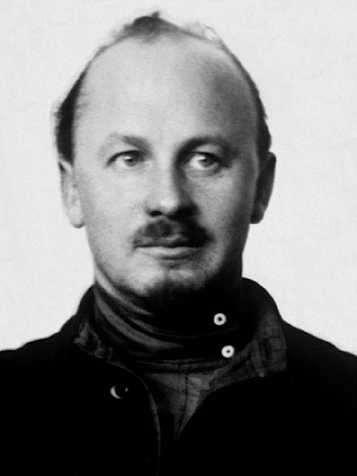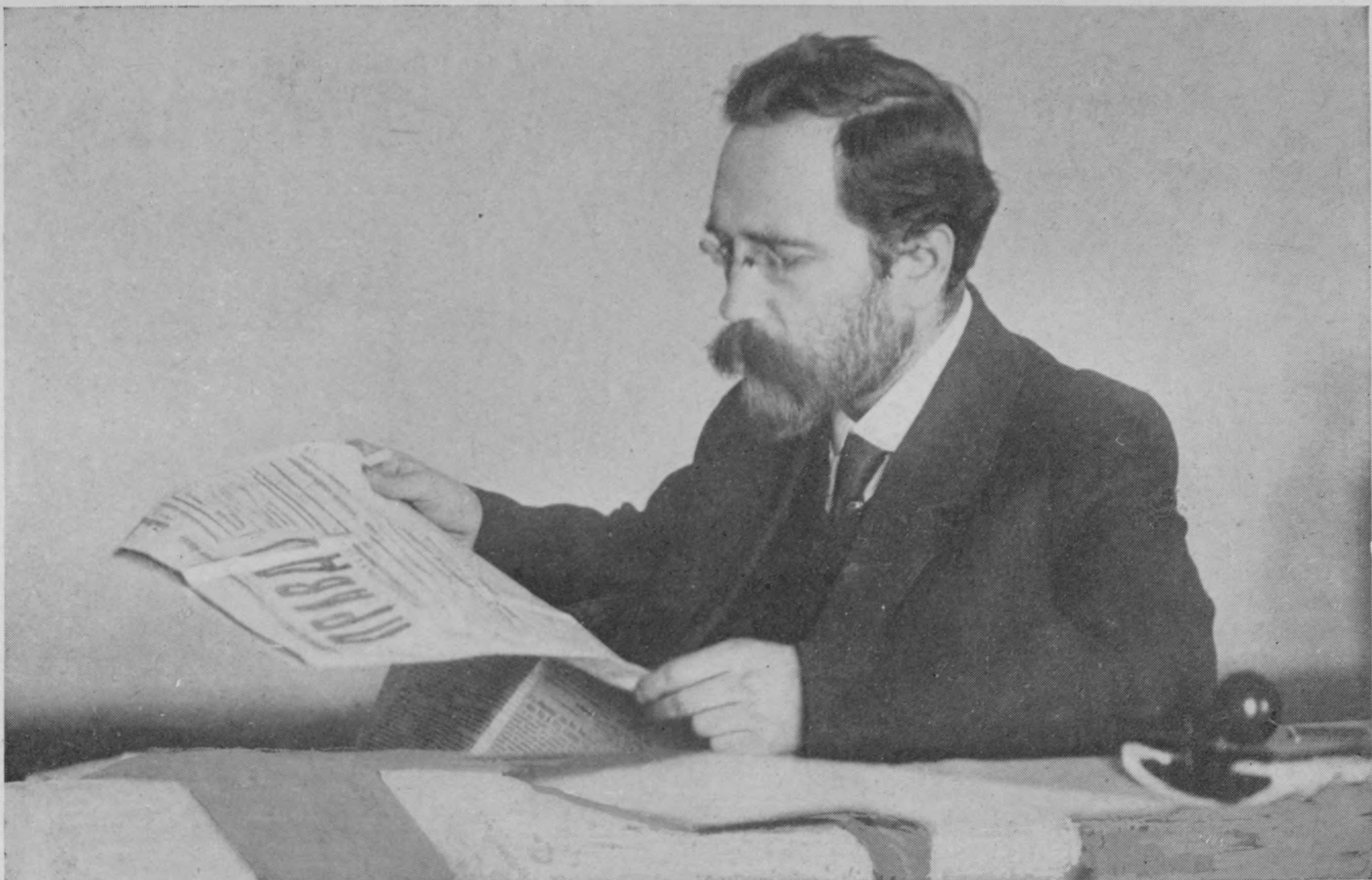|
Lev Chernyi
Lev Chernyi ( rus, Лев Чёрный, p=ˈlʲef ˈtɕɵrnɨj, a=Lyev Chyornyy.ru.vorb.oga; born Pavel Dimitrievich Turchaninov, rus, Па́вел Дми́триевич Турчани́нов, p=ˈpavʲɪl ˈdmʲitrʲɪjɪvʲɪtɕ tʊrtɕɪˈnʲinəf; died September 21, 1921) was a Russian individualist anarchist theorist, activist and poet, and a leading figure of the Third Russian Revolution. In 1917, Chernyi was released from his political imprisonment by the Imperial Russian regime, and swiftly became one of the leading figures in Russian anarchism. After strongly denouncing the new Bolshevik government in various anarchist publications and joining several underground resistance movements, Chernyi was arrested by the Cheka on a charge of counterfeiting and in 1921 was executed without trial. Early life, philosophy and imprisonment Chernyi was born Pavel Dimitrievich Turchaninov to an army colonel father. A "déclassé intellectual" whom anarchist historian Paul Avrich c ... [...More Info...] [...Related Items...] OR: [Wikipedia] [Google] [Baidu] |
Jason McQuinn
''Alternative Press Review'' (byline: "Your guide beyond the mainstream") is a libertarian American magazine established in 1993 as a sister periodical to '' Anarchy: A Journal of Desire Armed''. The first issue was published in Fall 1993. As of 2002, its editorial collective consisted of Jason McQuinn (''Anarchy''), Chuck Munson ( Infoshop.org) and Thomas Wheeler (''Out of Bounds''). Munson was co-editor and reviewer from 1997 to 2003, when he was replaced by Allan Antliff. The magazine was first published by C.A.L. Press and then by AAL Press. According to its self-description, "''The Alternative Press Review'' is your window on the world of independent media. ''APR'' publishes a wide variety of the best essays from radical zines, books, magazines, blogs and web sites. Plus, ''APR'' publishes a selection of short and lively article excerpts, along with reviews, commentary and columns on the alternative press scene and other alternative media." In practice the magazine has featu ... [...More Info...] [...Related Items...] OR: [Wikipedia] [Google] [Baidu] |
Mir (social)
Obshchina ( rus, община, p=ɐpˈɕːinə, literally "commune") or mir (russian: мир, literally "society", among other meanings), or selskoye obshchestvo (russian: сельское общество, literally "rural community", official term in the 19th and 20th century; sil's'ke tovarystvo, uk, сільське товариство, literally "rural community"), were peasant village communities as opposed to individual farmsteads, or khutors, in Imperial Russia. The term derives from the word ''obshchiy'' (russian: общий, literally "common"). The mir was a community consisting of former serfs, or state peasants and their descendants, settled as a rule in a single village, although sometimes a village included more than one mir and, conversely, several villages were sometimes combined in a single mir. The title of the land was vested in the mir and not in the individual peasant. Members of the mir had the right to the allotment, on some uniform basis, of a holding t ... [...More Info...] [...Related Items...] OR: [Wikipedia] [Google] [Baidu] |
Lev Kamenev
Lev Borisovich Kamenev. (''né'' Rozenfeld; – 25 August 1936) was a Bolshevik revolutionary and a prominent Soviet politician. Born in Moscow to parents who were both involved in revolutionary politics, Kamenev attended Imperial Moscow University before becoming a revolutionary himself, joining the Russian Social Democratic Labour Party (RSDLP) in 1901 and was active in Moscow, Saint Petersburg and Tiflis (now Tbilisi). He took part in the failed Russian Revolution of 1905. Relocating abroad in 1908, Kamenev became an early member of the Bolsheviks and a close associate of the exiled Vladimir Lenin. In 1914, he was arrested on his return to Saint Petersburg and exiled in Siberia, but was able to return following the February Revolution of 1917 which overthrew the Tsarist monarchy. In 1917, he served briefly as the equivalent of the first head of state of Soviet Russia. Kamenev disagreed with Lenin's strategy of armed uprising during the October Revolution, but nevertheless ... [...More Info...] [...Related Items...] OR: [Wikipedia] [Google] [Baidu] |
Propaganda
Propaganda is communication that is primarily used to influence or persuade an audience to further an agenda, which may not be objective and may be selectively presenting facts to encourage a particular synthesis or perception, or using loaded language to produce an emotional rather than a rational response to the information that is being presented. Propaganda can be found in news and journalism, government, advertising, entertainment, education, and activism and is often associated with material which is prepared by governments as part of war efforts, political campaigns, health campaigns, revolutionaries, big businesses, ultra-religious organizations, the media, and certain individuals such as soapboxers. In the 20th century, the English term ''propaganda'' was often associated with a manipulative approach, but historically, propaganda has been a neutral descriptive term of any material that promotes certain opinions or ideologies. Equivalent non-English terms have also la ... [...More Info...] [...Related Items...] OR: [Wikipedia] [Google] [Baidu] |
Nicholas II Of Russia
Nicholas II or Nikolai II Alexandrovich Romanov; spelled in pre-revolutionary script. ( 186817 July 1918), known in the Russian Orthodox Church as Saint Nicholas the Passion-Bearer,. was the last Emperor of Russia, King of Congress Poland and Grand Duke of Finland, ruling from 1 November 1894 until his abdication on 15 March 1917. During his reign, Nicholas gave support to the economic and political reforms promoted by his prime ministers, Sergei Witte and Pyotr Stolypin. He advocated modernization based on foreign loans and close ties with France, but resisted giving the new parliament (the Duma) major roles. Ultimately, progress was undermined by Nicholas's commitment to autocratic rule, strong aristocratic opposition and defeats sustained by the Russian military in the Russo-Japanese War and World War I. By March 1917, public support for Nicholas had collapsed and he was forced to abdicate the throne, thereby ending the Romanov dynasty's 304-year rule of Russia (16 ... [...More Info...] [...Related Items...] OR: [Wikipedia] [Google] [Baidu] |
Moscow Federation Of Anarchist Groups
The Moscow Federation of Anarchist Groups (MFAG) was a network of anarchist groups established in Moscow in 1917. They occupied the Merchants' House shortly after the February Revolution. They published ''Anarkhiia'', weekly after its launch in September 1917 and then as a daily from March 1918. Following the October Revolution of November 1917, they were involved in the development of the Black Guards into a significant military force in Moscow. On 3 March 1918 the Bolsheviks signed the Brest-Litovsk Treaty, which precipitated a political crisis with their erstwhile allies amongst the Anarchists and Left Socialist Revolutionaries. On 12 April, 1918 the Bolshevik authorities moved against the Anarchists: 26 centres were raided in Moscow, forty anarchists were killed and over 500 were arrested. Lev Chernyi Lev Chernyi ( rus, Лев Чёрный, p=ˈlʲef ˈtɕɵrnɨj, a=Lyev Chyornyy.ru.vorb.oga; born Pavel Dimitrievich Turchaninov, rus, Па́вел Дми́триевич Т� ... [...More Info...] [...Related Items...] OR: [Wikipedia] [Google] [Baidu] |
Secretary
A secretary, administrative professional, administrative assistant, executive assistant, administrative officer, administrative support specialist, clerk, military assistant, management assistant, office secretary, or personal assistant is a white-collar worker person whose work consists of supporting management, including executives, using a variety of project management, communication, or organizational skills within the area of administration. There is a diverse array of work experiences attainable within the administrative support field, ranging between internship, entry-level, associate, junior, mid-senior, and senior level pay bands with positions in nearly every industry. However, this role should not be confused with the role of an executive secretary, cabinet secretary such as cabinet members who hold the title of "secretary," or company secretary, all which differ from an administrative assistant. The functions of a personal assistant may be entirely carried out to ... [...More Info...] [...Related Items...] OR: [Wikipedia] [Google] [Baidu] |
Lecturer
Lecturer is an List of academic ranks, academic rank within many universities, though the meaning of the term varies somewhat from country to country. It generally denotes an academic expert who is hired to teach on a full- or part-time basis. They may also conduct research. Comparison The table presents a broad overview of the traditional main systems, but there are universities which use a combination of those systems or other titles. Note that some universities in Commonwealth countries have adopted the American system in place of the Commonwealth system. Uses around the world Australia In Australia, the term lecturer may be used informally to refer to anyone who conducts lectures at a university or elsewhere, but formally refers to a specific academic rank. The academic ranks in Australia are similar to those in the UK, with the rank of associate professor roughly equivalent to reader in UK universities. The academic levels in Australia are (in ascending academic level) ... [...More Info...] [...Related Items...] OR: [Wikipedia] [Google] [Baidu] |
Moscow
Moscow ( , US chiefly ; rus, links=no, Москва, r=Moskva, p=mɐskˈva, a=Москва.ogg) is the capital and largest city of Russia. The city stands on the Moskva River in Central Russia, with a population estimated at 13.0 million residents within the city limits, over 17 million residents in the urban area, and over 21.5 million residents in the metropolitan area. The city covers an area of , while the urban area covers , and the metropolitan area covers over . Moscow is among the world's largest cities; being the most populous city entirely in Europe, the largest urban and metropolitan area in Europe, and the largest city by land area on the European continent. First documented in 1147, Moscow grew to become a prosperous and powerful city that served as the capital of the Grand Duchy that bears its name. When the Grand Duchy of Moscow evolved into the Tsardom of Russia, Moscow remained the political and economic center for most of the Tsardom's history. When th ... [...More Info...] [...Related Items...] OR: [Wikipedia] [Google] [Baidu] |
Czar
Tsar ( or ), also spelled ''czar'', ''tzar'', or ''csar'', is a title used by East and South Slavic monarchs. The term is derived from the Latin word ''caesar'', which was intended to mean "emperor" in the European medieval sense of the term—a ruler with the same rank as a Roman emperor, holding it by the approval of another emperor or a supreme ecclesiastical official (the Pope or the Ecumenical Patriarch)—but was usually considered by western Europeans to be equivalent to "king". It lends its name to a system of government, tsarist autocracy or tsarism. "Tsar" and its variants were the official titles of the following states: * Bulgarian Empire (First Bulgarian Empire in 681–1018, Second Bulgarian Empire in 1185–1396), and also used in Tsardom of Bulgaria, in 1908–1946 * Serbian Empire, in 1346–1371 * Tsardom of Russia, in 1547–1721 (replaced in 1721 by ''imperator'' in Russian Empire, but still remaining in use, also officially in relation to several regi ... [...More Info...] [...Related Items...] OR: [Wikipedia] [Google] [Baidu] |
Siberia
Siberia ( ; rus, Сибирь, r=Sibir', p=sʲɪˈbʲirʲ, a=Ru-Сибирь.ogg) is an extensive geographical region, constituting all of North Asia, from the Ural Mountains in the west to the Pacific Ocean in the east. It has been a part of Russia since the latter half of the 16th century, after the Russians conquered lands east of the Ural Mountains. Siberia is vast and sparsely populated, covering an area of over , but home to merely one-fifth of Russia's population. Novosibirsk, Krasnoyarsk and Omsk are the largest cities in the region. Because Siberia is a geographic and historic region and not a political entity, there is no single precise definition of its territorial borders. Traditionally, Siberia extends eastwards from the Ural Mountains to the Pacific Ocean, and includes most of the drainage basin of the Arctic Ocean. The river Yenisey divides Siberia into two parts, Western and Eastern. Siberia stretches southwards from the Arctic Ocean to the hills of north-ce ... [...More Info...] [...Related Items...] OR: [Wikipedia] [Google] [Baidu] |
Benjamin Tucker
Benjamin Ricketson Tucker (; April 17, 1854 – June 22, 1939) was an American individualist anarchist and libertarian socialist.Martin, James J. (1953)''Men Against the State: The Expositers of Individualist Anarchism in America, 1827–1908'' Auburn: Mises Institute. pp. 202–233. . Tucker was the editor and publisher of the periodical '''' (1881–1908 ... [...More Info...] [...Related Items...] OR: [Wikipedia] [Google] [Baidu] |









